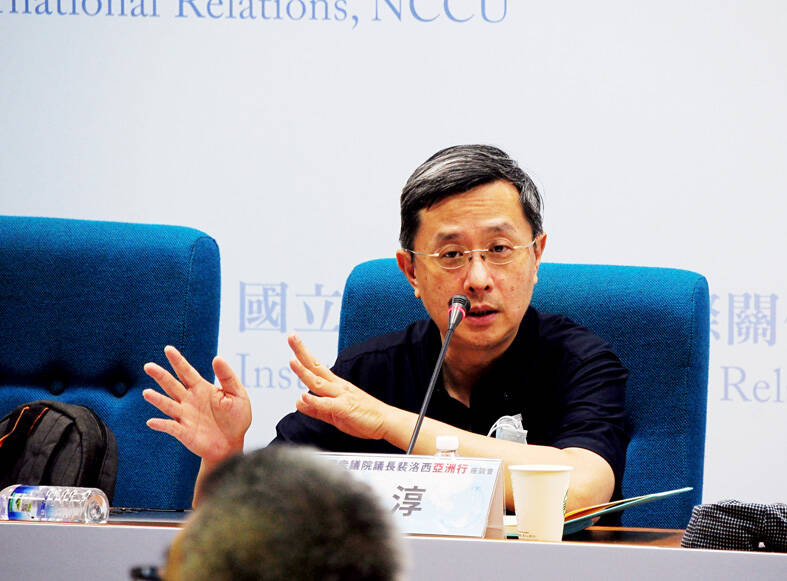A proposed US-led chip alliance is aimed not only at boosting production, but is also seen as a US move to counter China’s growing influence in the global chip market, Chung-Hua Institution for Economic Research economist Roy Lee (李淳) said on Sunday.
The Chip 4 alliance is a proposed alliance of semiconductor powerhouses in the US, Taiwan, Japan and South Korea, to enhance cooperation on the design and production of sophisticated semiconductors.
With a preliminary meeting of the alliance reportedly expected to take place at the end of this month or early next month, the Ministry of Economic Affairs has proposed continuing its collaboration with the US on supply chain resilience and industrial cooperation, as well as semiconductor supply security.

Photo: CNA
Lee, deputy executive director of the Taiwan WTO & RTA Center at the institute, said that the ministry’s proposal to cooperate on supply chain security was made with Taiwan’s needs in mind.
Although Taiwan is strong in semiconductor foundries, it relies on the US and Japan for the supply of equipment and materials, he said, adding that there are areas where the three nations are reliant on each other.
If the US aims only to bring semiconductor production back home, it only needs to negotiate with individual nations, Lee said.
As such, it is believed that the US might want to work with Taiwan, Japan and South Korea to impose controls on semiconductor exports and technology outflows, forming an anti-China group to exclude Beijing from global semiconductor supply chains, he said.
However, the US proposal might put a certain amount of pressure on South Korea due to its economic ties with China, its biggest trade partner, so Washington wants to talk to Seoul to see whether it plans to join Chip 4, Lee said.
China, including Hong Kong, accounts for almost 60 percent of the exports of South Korean chips, according to a report in the Korea Herald, South Korea’s largest English-language daily, which presents a dilemma for Seoul in having to choose between US technology and the Chinese market, he said.
On the pros and cons of Taiwan’s participation in the alliance, Lee said that Taiwan should participate, given the close semiconductor links between Taiwan and the US, especially regarding supply chains and intelligence gathering.
The US Congress last month passed the CHIPS Act of 2022 to strengthen domestic semiconductor manufacturing, design and research.
In addition, Washington has been promoting the Chip 4 alliance and announced a ban on exports of advanced electronic design automation software tools for 3-nanometer and other advanced chips to China in an effort to curb the development of China’s chip industry.

UNCERTAINTY: Innolux activated a stringent supply chain management mechanism, as it did during the COVID-19 pandemic, to ensure optimal inventory levels for customers Flat-panel display makers AUO Corp (友達) and Innolux Corp (群創) yesterday said that about 12 to 20 percent of their display business is at risk of potential US tariffs and that they would relocate production or shipment destinations to mitigate the levies’ effects. US tariffs would have a direct impact of US$200 million on AUO’s revenue, company chairman Paul Peng (彭雙浪) told reporters on the sidelines of the Touch Taiwan trade show in Taipei yesterday. That would make up about 12 percent of the company’s overall revenue. To cope with the tariff uncertainty, AUO plans to allocate its production to manufacturing facilities in

Taiwan will prioritize the development of silicon photonics by taking advantage of its strength in the semiconductor industry to build another shield to protect the local economy, National Development Council (NDC) Minister Paul Liu (劉鏡清) said yesterday. Speaking at a meeting of the legislature’s Economics Committee, Liu said Taiwan already has the artificial intelligence (AI) industry as a shield, after the semiconductor industry, to safeguard the country, and is looking at new unique fields to build more economic shields. While Taiwan will further strengthen its existing shields, over the longer term, the country is determined to focus on such potential segments as

TAKING STOCK: A Taiwanese cookware firm in Vietnam urged customers to assess inventory or place orders early so shipments can reach the US while tariffs are paused Taiwanese businesses in Vietnam are exploring alternatives after the White House imposed a 46 percent import duty on Vietnamese goods, following US President Donald Trump’s announcement of “reciprocal” tariffs on the US’ trading partners. Lo Shih-liang (羅世良), chairman of Brico Industry Co (裕茂工業), a Taiwanese company that manufactures cast iron cookware and stove components in Vietnam, said that more than 40 percent of his business was tied to the US market, describing the constant US policy shifts as an emotional roller coaster. “I work during the day and stay up all night watching the news. I’ve been following US news until 3am

COLLABORATION: Given Taiwan’s key position in global supply chains, the US firm is discussing strategies with local partners and clients to deal with global uncertainties Advanced Micro Devices Inc (AMD) yesterday said it is meeting with local ecosystem partners, including Taiwan Semiconductor Manufacturing Co (TSMC, 台積電), to discuss strategies, including long-term manufacturing, to navigate uncertainties such as US tariffs, as Taiwan occupies an important position in global supply chains. AMD chief executive officer Lisa Su (蘇姿丰) told reporters that Taiwan is an important part of the chip designer’s ecosystem and she is discussing with partners and customers in Taiwan to forge strong collaborations on different areas during this critical period. AMD has just become the first artificial-intelligence (AI) server chip customer of TSMC to utilize its advanced